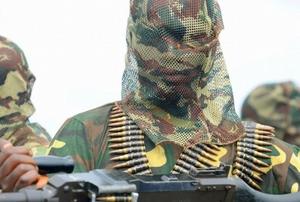Islamic terrorism spreads in Nigeria
Nigeria, with a population of 150 million, is the most populous country in Africa, the eighth most populous country in the world, and the most populous country in the world in which the majority of the population is black; Nigeria’s population is almost evenly split between Muslims in the north and the predominantly Christian south; radical Islamic groups have increased their influence in the north by attacking law enforcement units and killing politicians, civil servants, teachers, and others who, according to the Islamists, stand in the way of the imposition of Sharia law in the north; in the past few years these groups have been pushing south, extending their terror campaign to central Nigeria, in the nation’s “middle belt,” where dozens of ethnic groups vie for control of fertile lands.

Member of Nigeria's Boko Haram militant group // Source: neorepublica.com
A radical Muslim sect has claimed responsibility for the Christmas Eve bombings and church attacks in Nigeria that killed at least 38 people, and the group threatened new attacks to avenge local violence against Muslims.
Religious fighting has left more than 500 people dead this year in the deeply divided region where Jos is located. Authorities had already blamed the Boko Haram group for some of the deaths Friday. “Therefore we will continue with our attacks on disbelievers and their allies and all those who help them,” said the group, which also said it has taken on a new name.
Two bombs went off near a large market in Jos where people were doing last-minute Christmas shopping Friday. A third hit a mainly Christian area of Jos, while the fourth was near a road that leads to the city’s main mosque. Officials said at least 32 died from the blasts.
That same day, two churches were attacked in the northern city of Maiduguri about 320 miles away, killing at least six people. Authorities said a Baptist pastor and two choir members preparing for a late-night carol service were among the victims.
Fox News reports that the radical Muslim sect was thought to be vanquished in 2009. Nigeria’s military crushed its mosque into concrete shards, and its leader was arrested and died in police custody.
Now, a year later, Maiduguri and surrounding villages again live in fear of the group, whose members have assassinated police and local leaders and engineered a massive prison break, officials say. Western diplomats worry that the sect is catching the attention of al Qaeda’s North Africa branch. It remains unclear what, if any, formal links al Qaeda in the Islamic Maghreb has made with the sect.
Boko Haram says it has changed it name to: “The organization of followers of the teachings of Prophet Muhammad and champions of Islam and holy wars.”
Nigeria, a country of 150 million people, is almost evenly split between Muslims in the north and the predominantly Christian south. The blasts happened in central Nigeria, in the nation’s “middle belt,” where dozens of ethnic groups vie for control of fertile lands.
The violence, though fractured across religious lines, often has more to do with local politics, economics, and rights to grazing lands. The government of Plateau state, where Jos is the capital, is controlled by Christian politicians who have blocked Muslims from being legally recognized as citizens. That has locked many out of prized government jobs in a region where the tourism industry and tin mining have collapsed in the last decades.
